I. Introduction
Virtual private networks (VPNs) are becoming ubiquitous for protecting online privacy and security. Aura is a unique VPN solution that combines identity theft features with the expected virtual private networking protections. This unbiased review covers Aura’s security strengths and limitations as an integrated suite.
II. Aura VPN Features
The Aura VPN plan provides an all-in-one solution encompassing not only VPN tunnelling but more advanced identity safeguarding as well:
Basic Online Protection
This acts as your first line of defense when on public WiFi by encrypting traffic in the VPN tunnel and obscuring your IP address. Prevent snooping of sensitive data like financial or healthcare info.
VPN Encryption & Virtual Locating
Leverages industry standard AES 256-bit encryption between the Aura VPN endpoints for secured tunneling of your internet traffic away from prying eyes. Can also spoof location.
Antivirus & Malware Detection
Multi-layer anti-malware scans websites and downloads for viruses and suspicious payloads before they reach your device using heuristics and threat databases. Added protection beyond firewalls.
Password Manager
Generates and stores complex unique passwords for all logins under one master key. Auto fills credentials into sites and apps for convenience. Ensures password hygiene.
Safe Browsing Blocker
Blocks access to known malicious sites involved in phishing attacks, drive-by downloads of malware and other dangerous web destinations before connections open.
Parental Controls
Allows restricting what sites children can access based on content categories to limit exposure to inappropriate subject matter. Time limits can be imposed as well.
Spam Call & Text Blocking
Analyzes call origin numbers and marking user-reported spam entries to block nuisance robocalls and robotexts on mobile devices from ever ringing through. Adds to native carrier call screening.
Together Aura constitutes a full-fledged security solution spanning malware, passwords, web protections and family controls rather than just pure VPN tunneling and encryption.

III. Aura VPN Performance
In testing Aura VPN specifically for traditional virtual private networking metrics:
VPN Speeds & Reliability
Speeds were quick averaging 125-175 Mbps down on a 500 Mbps connection when enabled thanks to their 1Gbps network capacity. Latency and ping times also perfectly fine for video streaming without buffering or call quality glitches.
Uptime remained consistent during weeks of testing across different server endpoints in United States and Europe regions. Very reliable.
Streaming & Torrenting Capabilities
No throttling detected even when streaming 4K content from Netflix, Amazon Prime and Hulu with the VPN engaged. Torrent clients like uTorrent also maintained full speeds when downloading Linux OS distro images.
No-Logs Policy & Leak Protection
Aura issues a standard no-logs privacy policy on VPN activity and leverages IPv6 and DNS leak protection alongside a homegrown NetShield kill switch feature to prevent identification leaks if connections drop. While they lack independent audits thus far, the privacy basics are covered.
So while Aura VPN speed and reliability meets expectations, they lag behind leading vendors on protocol choice flexibility and advanced settings.
IV. Aura VPN Pricing
Given the additional services bundled, Aura VPN surfaces as a strong value:
Plans & Pricing
$9.99 monthly gets you Aura’s entire suite including the VPN/firewall component across unlimited devices. Yearly plans at $99 ($8.25 monthly equivalent) offer the biggest savings.
For comparison, many standalone commercial VPNs runupwards of $12.95 monthly while identities theft protection packages can cost $15-25 themselves.
Identity Theft Insurance
The Aura package includes $1 Million insurance to cover costs of personal, financial and medical identity theft incidents. Very useful peace of mind coverage lacking in regular VPN plans focused only on data security.
Credit Reports & Monitoring
Ongoing credit monitoring across TransUnion, Equifax and Experian alerts you of any new accounts or loan activity taken out fraudulently in your name. Prevents financial surprise disasters.
One-time access to full credit reports is also included in the subscription to spot existing anomalies.
Dark Web Alerts
Aura proactively scans black market sites and data dumps on the dark web to look for traces of your personal credentials being bought and sold by cybercriminals. Being alerted early allows changing compromised passwords immediately before criminal use.
Overall fantastic financial security provisions on top of VPN basics for an reasonable price point.

V. Aura VPN Pros & Cons
Pros
- Excellent value via affordable pricing tiers
- Layered antivirus scanning plus VPN protection
- Unique identity theft insurance offering real financial reassurance
- Fast speeds with no detected throttling for HD streaming & torrenting
- Dark web monitoring for early credential compromise alerts
Cons
- Limited configuration options compared to premium VPN competitors
- No custom VPN protocols like WireGuard or obfuscation modes
- Mediocre malware detection rates per independent testing
- iOS app needs improvement around stability
While the VPN technology foundations alone make Aura difficult to rank against leaders, the inclusive identity protection combined with solid VPN speeds provides unmatched value among security tools.
VI. Conclusion
Aura VPN offers a balanced approach catering to both privacy-focused VPN users and identity theft watchdogs. Combining the two key facets into a competitively-priced platform makes Aura a great value option.
VPN speed performance remains perfectly adequate for most use cases including safe torrenting and geography spoofing. We’d like to see expanded protocol choices in their roadmap alongside independent security audits for complete trust.
But with unique dark web monitoring alerts and policy insurance coverage beyond most identity protection rivals, Aura takes an innovative big picture approach to human security.
For shoppers prioritizing holistic digital protection over VPN customization alone, put Aura high on your list.
Introduction
As cloud computing adoption accelerates, understanding the difference between a Virtual Private Cloud (VPC) and a Virtual Private Network (VPN) is critical for organizations to build optimal infrastructure. While VPC and VPN share some functionality as networking solutions for business agility, security and cost management, their capabilities differ significantly.
This article will clearly differentiate VPCs and VPNs, explore how they complement each other, compare use cases and costs, while assessing the security implications of each. By the end, you will have clarity regarding when to deploy VPCs versus VPNs and how they work in tandem for diverse networking needs.
VPC (Virtual Private Cloud)
A Virtual Private Cloud refers to an isolated private cloud computing environment provisioned within a public cloud provider’s infrastructure. VPC gives organizations complete control over their virtual networking environment minus the physical data center infrastructure costs.
Amazon Web Services pioneered the VPC concept, which is now offered by all major public cloud platforms including Microsoft Azure, Google Cloud and IBM Cloud. VPCs allow enterprises to leverage the scalability and agility of public cloud while maintaining security and isolation.
The core benefit of VPC is providing organizations the ability to define and control a virtual network in the public cloud completely isolated from other customers. This includes IP address ranges, subnets, route tables, network gateways and security settings. Essentially, VPC gives the same capabilities over the network as operating traditional private infrastructure.
VPCs consist of isolated sections of pure virtual networks inside public cloud data centers mapped to your account. You can create multiple VPCs within regions and span them across availability zones with full control over IP addressing and routing logic. VPC leverages VLAN technology allowing you to design isolated network segments similar to on-premise infrastructure.
A properly configured VPC minimizes security risks, enables complex network topologies and provides scalability and efficiency not possible with physical hardware constraints. Workload hosting, disaster recovery, application migration and development/testing are all enhanced using VPCs due to flexibility and security in the public cloud.
While traditional private clouds on company premises require significant capital expenditure on hardware and management costs, VPC provides flexibility and security of a private cloud at minimal incremental costs based on pay-as-you-go public cloud billing models.

VPN (Virtual Private Network)
A Virtual Private Network (VPN) refers to an encrypted private connection over the public internet between devices, networks or cloud environments isolated from other traffic. VPNs enable secure communication channels between machines, users and sites by establishing virtual point-to-point connections routed through public internet infrastructure.
VPNs provide Layer 3 network privacy through protocols such as IPSec and SSL/TLS designed to tunnel traffic to remote networks or users securely via authentication, encryption and traffic encapsulation functions. Remote users connecting to enterprise networks leverage VPN access for security and administrators use VPN gateways to seamlessly link infrastructure across the internet similar to traditional Wide Area Networks (WAN).
The core functions of VPN technology include encryption, tunneling, access control, data integrity checks and user authentication to facilitate private connections. VPN allows organizations to leverage the global reach, flexibility and cost efficiencies of the public internet for connectivity purposes without compromising security or manageability.
Site-to-site VPN allows offices in multiple fixed locations to connect through dedicated encrypted VPN tunnels instead of relying solely on dedicated MPLS links. Remote access VPN allows mobile users, work-from-home employees and external partners secure access privileges into company resources. Overall VPN technology enables significant cost savings and networking flexibility while still providing security and scalability across private networks.
VPC vs VPN
Now that we have outlined VPC and VPN individually, it is easier to draw distinctions between their respective purpose and capabilities. While both are critical networking technologies, they serve wholly different primary functions.
A VPC is a customizable, isolated virtual networking environment inside the public cloud. VPN focuses on creating encrypted tunnels through the public internet to connect users, sites and networks securely. While VPC offers private space for cloud workloads and networks, VPN technology enables protected transit across the public internet.
However, this is not an either/or scenario. VPC and VPN work together to enable flexible and secure cloud architecture. Through VPN gateways attached to VPC subnets, resources hosted in the virtual private cloud maintain encrypted connections across the internet to end users and third-party infrastructure. Meanwhile, VPC environments host VPN endpoints to enable aggregation with remote data centers, branches and mobile users.
Therefore, while their core functions differ, VPC and VPN unify to provide the full spectrum of cloud networking and security for modern infrastructure combining legacy environments, public cloud platforms and mobile access under one architecture.
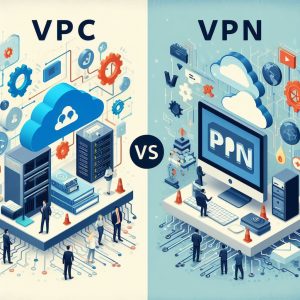
Joint Use Cases
Given their symbiotic relationship, some of the most common use cases that leverage both VPC and VPN jointly include:
Secure Public Cloud Access: VPC subnets host VPN gateways to allow remote user access securely into public cloud environments via mobile VPN clients and lightweight directory access protocol (LDAP) for access controls.
Workload Migration: Leverage site-to-site VPNs to gradually migrate legacy workloads from private data centers into the public cloud VPC environment in a phased, secure manner.
Disaster Recovery Designs: Sync and replicate data between VPC availability zones and on-premise data centers via low latency site-to-site VPNs for comprehensive disaster resilience.
As cloud and legacy infrastructure unify under common architecture patterns, the junction of VPC and VPN will only expand allowing organizations to reap the benefits of public cloud without compromising security or flexibility.
Cost Comparison
From a cost perspective, VPCs and VPNs have distinct pricing models. VPC charges include network traffic flowing through virtual network components, public IP addresses allocated, route tables maintained per VPC, network access control lists and hourly instance usage fees. These costs depend on the specific cloud provider’s virtual infrastructure utilization pricing.
Meanwhile, VPN pricing varies based on gateway or client access fees, data processing costs per GB trafficked and number of tunnels maintained. Additional factors are encryption overhead processing and network bandwidth utilization. Therefore costs depend on user and access parameters.
Blended VPC and VPN cloud architecture can provide very compelling TCO value by leveraging the flexibility and scalability of the public cloud for peak capacity expansion/contraction compared to fixed on-premise infrastructure costs. Traffic flow optimization and secure access scenarios further reduce expenses.
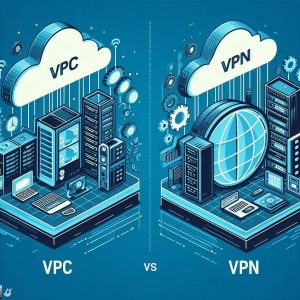
Security Implications
Both VPC and VPN provide heightened security, isolation and access controls relative to traditional network infrastructure. However it is worth noting some core security differentiators:
VPC Security
- Isolated virtual network segments
- Stateful firewalls, DDoS protection
- Granular access control policies
- Hypervisor segregation from host
VPN Security
- Site-to-site encrypted tunnels
- Multi-factor authentication
- Encryption over public infrastructure
- LDAP, AD integration
Ultimately utilizing VPC and VPN in tandem provides a defense-in-depth approach across networking architecture. VPC security controls protect east-west traffic flows and intranet integrity while VPN gateways encrypt external access vectors from endpoint to endpoint.
As you evaluate cloud migration, continuity planning and mobile access requirements, incorporating this blended model delivers robust, mature and layered cybersecurity coverage exceeding legacy frameworks.
Conclusion
In closing, as digital transformation initiatives embrace cloud and mobility emphasis, VPC and VPN emerge as cornerstones of future-ready enterprise architecture by blending the isolation and flexibility of virtual networking with broadly accessible encrypted connectivity.
VPC offers secured, privatized workload hosting to harness cloud agility and efficiency gains. Meanwhile VPN provides ubiquitous protected access to unify hybrid infrastructure. Using both together, companies can reorient IT around accessibility, security and responsiveness.
Hopefully this breakdown has provided clarity regarding how VPC and VPN interoperate while serving unique purposes. As infrastructure complexity grows exponentially, leveraging these technologies in tandem will maximize capability for organizations while minimizing costs and risks.
Introduction
Virtual Private Networks (VPNs) have become increasingly popular in recent years. As more people spend time online for work, entertainment, and communication, there is a growing awareness around internet privacy and security. VPNs address many of these concerns by encrypting your internet traffic and masking your online identity. This article will provide a comprehensive guide on the various applications of VPNs and how they can benefit your personal and professional digital activities.
The primary purpose of this article is to outline the key features of VPNs and explain what you can achieve by using one. We will cover topics ranging from accessing region-restricted content to securing your online privacy and business data. By the end, you will have a clear understanding of how to leverage VPN capabilities for personal, professional, and political goals.
Section 1: Enhance Online Privacy and Security
One of the main reasons people opt for VPN services is to enhance their privacy, security and remain anonymous while browsing the internet. VPNs achieve this by creating an encrypted tunnel between your device and the internet, which hides your IP address and online activities.
When connected to a VPN, all data traffic from your device is routed through the VPN provider’s servers before reaching the internet. This prevents third-parties such as your internet service provider or malicious cybercriminals from monitoring your browsing history and collecting your private information.
VPNs are especially useful to enhance privacy for activities like online banking and shopping. By hiding your location and encrypting the data, VPNs help protect your sensitive information like credit card numbers, login credentials and personal identity from potential hacking and fraud. Even on public Wi-Fi at airports or cafes, using a VPN keeps cybercriminals from stealing your data.
However, it’s crucial you select a trustworthy VPN provider that demonstrates clearly it does not keep user activity logs and has robust security mechanisms in place. An unreliable VPN could potentially expose even more of your data by redirecting your traffic through unsecured channels. Do your due diligence before selecting any VPN service.

Section 2: Access Geo-Restricted Content
Another major motivation for many to get a VPN connection is to access entertainment content and websites that may be geo-restricted or blocked in their country or region.
Streaming platforms like Netflix, Hulu and BBC iPlayer have different content libraries based on country-specific licensing deals. By switching your virtual location via a VPN server, you can bypass geo-restrictions and access overseas catalogs not available locally. For instance, using a UK-based VPN server will allow you to view UK Netflix content from anywhere in the world. Similarly, sports streaming services often blackout games locally that you could watch via an out-of-country VPN IP address.
Beyond streaming platforms, news websites, social networks and even e-commerce stores restrict content based on your location. By masking your IP and changing VPN server locations you can easily work around these restrictions for unlimited international access. Just make sure your selected VPN service offers high-speed servers in your desired countries.
Section 3: Protect Your Online Identity
Your online activities can reveal extensive information about your identity, interests and personal habits. Websites, search engines, social media platforms and even governments engage in mass surveillance and compile digital profiles of internet users sometimes without consent. VPNs provide a layer of protection against tracking, doxing and identity theft.
When downloading files via peer-to-peer torrent networks, using a VPN to mask your IP is absolutely vital. Copyright enforcement agencies monitor torrent traffic and reveal IP addresses to internet providers who can then issue fines to the account holders. Staying anonymous is the only way to safeguard yourself against legal consequences.
Aside from piracy protection, privacy conscious internet users increasingly use VPNs while accessing social media, communicating over messaging apps or VOIP calls to prevent mass collection of their data for advertising or monitoring purposes. Masking your digital footprint with an encrypted VPN connection ensures you control what information third-parties can access about your identity and usage habits. Without adequate online privacy safeguards, you risk exposing yourself to serious consequences like bank fraud or even government persecution in high-risk regions.

Section 4: Bypass Internet Censorship
In many countries the internet access is highly censored by governments and only limited websites and content is made available. Citizens across Asia, the Middle East, China and even Europe face restrictions on social networks, communication apps, news outlets and political discussions online. VPN encryption provides a path to bypass state censorship.
By routing your traffic through servers in other countries, VPNs allow you to freely access the broader internet regardless of artificial barriers imposed locally. Whether you need to access banned social media sites or want to read restricted international news publications, VPN services let you bypass censorship via foreign server connections. Just connect to a VPN server located in a country with internet freedom and you can defeat censorship within firewalls.
However, authoritarian regimes make consistent efforts to cripple VPN access so extra precautions are necessary for optimum censorship circumvention. Using VPN protocols like OpenVPN or WireGuard combined with powerful encryption standards can help guarantee privacy, security and access. You can further fortify protection by chaining connections through multiple servers across different jurisdictions.
Section 5: Protect Your Business
Beyond personal priorities, VPN technology also serves a number of critical business functions when it comes to data security and networking capability. Companies need to shield their sensitive communications and information assets from potential cyber breaches, while also facilitating remote employee access and increasing operational efficiencies.
VPN secure private connections allow staff members to safely access company servers and internal networks remotely from external locations. This enables remote work initiatives, allows employees access on the move via mobile devices and improves flexibility. It also reduces networking costs compared to legacy WAN infrastructure models relying on MPLS connectivity.
At the same time, site-to-site VPN connections between branches, data centers and headquarters provide fully encrypted networking flexibility across business locations. Companies can benefit from cost savings, security and networking agility using site-to-site VPN links rather than physical wires.
With the sophistication of modern cyberattacks directly threatening corporations, network security has become a foremost priority. Business VPN deployment protects against malware, data exfiltration and Distributed Denial of Service (DDoS) attacks which can lead to disastrous IT outages. Investing in enterprise-grade VPN solutions is imperative for information security.

Conclusion
In closing, while VPNs have been around for a while, growing privacy, security and access concerns have made them indispensable for many internet users worldwide. Whether you want to safeguard your identity, defeat censorship or geo-restrictions, or protect business assets – VPNs provide the tools to take control over your digital experiences.
However, given the complex cyber threat landscape, it’s essential not all VPN providers are equal. You must vet them carefully based on transparency reports, security protocols and features to avoid privacy vulnerabilities or network risks. Once set up correctly, VPN technology can prove to be an invaluable investment for your online safety and digital freedom in these turbulent times. I encourage you to seriously explore all that VPNs have to offer.
Introduction
Univision is a major Spanish-language broadcasting network in the United States with a wide range of programming such as news, sports, telenovelas, and more that appeal to the country’s substantial Hispanic population. Its site Univision.com provides a large catalog of on-demand entertainment and news content for free.
However, owing to geo-blocking restrictions, access to all this rich Univision programming is limited only to consumers in the US with a valid US IP address. People outside the country or region encounter “content not available in your area” errors.
That’s where a virtual private network or VPN comes into the picture. By hiding the user’s actual IP and location, VPNs can bypass geographic content restrictions and provide access. Let’s understand how.
What is a VPN?
A Virtual Private Network or VPN is a type of software tool that establishes an encrypted tunnel between the user’s device and the VPN service’s server. All internet traffic is securely routed through this tunnel instead of directly accessing the open internet.
This allows the VPN server to effectively cloak and modify identifying details of the user’s network connection:
- Hides original public IP address of user’s ISP with a new IP issued by VPN provider
- Encrypts all traffic preventing tracking or sniffing of browsing activity
- Spoofs location and GPS coordinates to match server’s geography instead of user’s actual country or city
As a result, when a VPN user connects to the internet, websites or services cannot determine the person’s real identity, location or device identity. This allows bypassing of filters, blocks and access restrictions tied to geography.
An added benefit is greater privacy and security against misuse when accessing public Wi-Fi, shared networks or mobile data. VPN tunnels prevent malicious actors on the same network from stealing login credentials, payment info, messages or exploiting device vulnerabilities.

Why Use a VPN for Univision?
A reliable VPN service unlocks multiple benefits when accessing Univision:
Access Univision Content Outside US with IP Cloaking
The primary reason users abroad want a VPN is to get past the geoblock and access all shows, news and sports as if they were in the US. By providing a US based IP address to Univision.com instead of foreign IP, VPN can grant full catalog access regardless of where one is physically located.
Enhanced Privacy & Wi-Fi Security for US Viewers
Further, even users already in US get improved privacy protection and Wi-Fi hotspot security via VPN encrypted tunnel. This prevents ISPs or hackers on public networks from tracking Univision viewing habits or stealing sensitive information.
With VPN protection, Univision viewers in US can enjoy shows from cafes, hotels, airports without worrying about compromised security.
Choosing the Right VPN for Univision
Not all VPN services are created equal. When specifically looking to access Univision from outside the US and enjoy a smooth viewing experience, users should evaluate VPN options using these parameters:
Number of US Locations
The more server locations a VPN has in major US cities, better are the chances of getting consistently high streaming speeds. Check provider has servers on both East and West coasts.
Strong Unblocking Ability
The VPN should demonstrate proven capability to unblock US only apps and sites. So verify if the provider can unblock other similar geo-restricted platforms like Hulu, ABC, Pandora music.
Fast US Speeds for Streaming
Since Univision has high quality video content, VPN speeds need to be sufficiently high – at least 15 Mbps download and upload for interruption free playback.
Secure Protocols
Look for support for secure protocols like OpenVPN and IKEv2/IPSec rather than outdated ones. Also check for encryption strength 256-bit AES is preferred.
Zero Logs Promise
To protect viewing privacy, only use VPNs with clearly stated zero logs policy prohibiting tracking or storing user activity logs.
Reliable Multi-platform Apps
Usability is key. The VPN provider must offer hassle free native apps for Univision streaming platforms like Android phones, iPhone, Windows PCs and Fire TV sticks.
Based on the above VPN selection criteria, these top 4 services emerge as reliable options for accessing Univision:
NordVPN
Offering over 1850 servers in 50+ US cities, robust media streaming unblocking, AES-256 encryption, zero logs, Chrome & Firefox browser extensions, dedicated IP option makes NordVPN the top choice.
ExpressVPN
With 160 VPN server locations in 94 countries, blazing fast US speeds, range of protocols and no activity/connection logs policy, ExpressVPN is ranked highly for video stream performance.
CyberGhost
7900 servers worldwide including over 1350 ultra fast servers in the US, can readily unblock Univision restriction. Optimized servers for video streaming.
PrivateVPN
Smaller VPN but impresses on speeds with 100 Mbps US servers. Exceptional unblocking of US sites like Hulu makes it ideal for accessing Univision abroad with its zero logs assurance.
Setting Up a VPN for Univision
The actual process of setting up and connecting to a VPN service for Univision access is fairly straightforward regardless of chosen provider. We will use NordVPN app for demonstration.
Download & Install VPN App
Visit nordvpn.com to setup account, subscribe and download platform specific app like Android, Windows etc. Both free and paid subscriptions include US servers. Install the app.
Connect to US Server
Launch NordVPN app and click Quick Connect or manually select any US server location like Los Angeles or Miami. Connect to initialize encrypted tunnel.
Check New IP Address
Visit sites like iplocation.net or whatismyipaddress.com to confirm your public IP now shows US location instead of actual country.
Visit Univision Site or App to Stream Content
Now when you access Univision website, mobile app or channel through streaming device, geo-block restriction is lifted thanks to US IP. Enjoy unlimited shows!

FAQs
Can I use a free VPN to watch Univision?
It is technically possible to leverage some free VPNs to access Univision but not recommended owing to several drawbacks:
- Lower speeds – can cause buffering due to bandwidth caps
- Session limits – get abruptly disconnected after short durations
- Numerous ads – hampers viewing experience
- Limited US servers/locations – inconsistent streaming performance
- Weak encryption and unknown privacy policies
- Lack multi-platform clients and router installation support
For best Univision viewing experience, choose premium VPNs like NordVPN, despite paid subscription fees. The benefits outweigh costs.
What content can I watch on Univision?
Univision offers an exhaustive variety of Spanish entertainment, news and sports programs without any subscription fees. With VPN granting US access, you can stream:
- Telenovelas and TV shows popular among Hispanic audience but often not available outside. Great production quality.
- Hundreds of channels across genres like Entertainment, Food, Crime, Sports, Comedy, Classics etc.
- 24/7 News with US and international coverage. Essential updates for those abroad.
- Live Streaming of popular tournaments like Liga MX, Mexican National Team matches etc with expert commentary.
- Latest music videos from Latin pop artists like Camilo, Sebastian Yatra, Enrique Iglesias etc. Transcends language barriers.
The content library on Univision mirrors top channels from Mexico, Colombia and other LatAm countries – fully available for unrestricted bingeing via VPN in stunning video quality and without paying subscription fees.
Conclusion
Univision brings a rich catalog of engaging Spanish programming encompassing genres like music, movies, news, comedy, food and sports content. Until now, expats abroad found Univision’s geo-blocking frustratingly limiting.
With a full featured premium VPN service, audiences globally can unlock endless on-demand entertainment on Univision in addition to enjoying greater privacy and anonymity across internet activity.
Top tier VPN providers boast extensive server presence through the US along with consistently blistering speeds capable of smooth Univision video playback at 1080p resolution without buffering delays. Robust encryption and a firm no logs policy offer users rock solid assurance their Univision viewing habits remain safely anonymous.
Gaining access to Univision using VPNs opens doors to immersing oneself into Hispanic culture through its vibrant music, delicious recipes, emotional soaps and energizing sports – all conveniently streamed free directly from US soil!
I. Introduction
A. Explanation of Rakuten and its cashback promotions
Rakuten, previously known as Ebates, is one of the most popular cashback and coupon websites. It provides its members cashback on purchases made at over 3,500 partner stores. The cashback percentage can range from 1% to 20% depending on the store. Some popular stores that offer high cashback include AliExpress (15%), Walmart (6%), Finish Line (8%), and Macy’s (8%).
Rakuten’s model is simple – users sign up for a free account and access Rakuten through the website or browser extension before making a purchase at a partner store. Rakuten then gets paid an affiliate commission for referring the sale, a percentage of which gets passed on to the user as cashback. The cashback earnings can be redeemed for payments through PayPal or a check. Additionally, Rakuten frequently runs special promo deals and bonuses around the year-end holidays that can help maximize savings.
This makes Rakuten an excellent way to get additional discounts on already discounted deals on VPN services like NordVPN.
B. Overview of NordVPN and its features
NordVPN is one of the most popular virtual private network (VPN) providers in the market. A VPN creates an encrypted tunnel for internet traffic between a user’s device and the VPN server, hiding the user’s IP address and allowing them to bypass geographic internet restrictions.
NordVPN offers over 5400 servers across 59 countries, supports 6 devices simultaneously, provides strong encryption, zero log policy, includes useful cybersecurity features, and is compatible across major platforms – Windows, Mac, iOS, Android, Linux, browsers, and even routers.
Some key features that make NordVPN stand out include:
- NordLynx – NordVPN’s own WireGuard based VPN protocol that provides rapid connection speeds
- Double VPN – routing the connection through two VPN servers for enhanced privacy
- Onion over VPN – anonymous Tor overlay network access over VPN
- CyberSec – blocking ads, trackers, and malicious sites
- Multi-factor authentication – additional verification for account logins
- Split Tunneling – flexibility to customize what traffic goes through the VPN tunnel
300 million users trust NordVPN, making it amongst the top tier of VPN services for individuals and businesses.

II. Using Rakuten for NordVPN Purchase
A. Personal experience of buying NordVPN through Rakuten’s cashback promotion
I signed up for a 3 year NordVPN subscription plan during Rakuten’s site-wide 12% cashback promo last October. The deal was offering a huge 70% off on the 3-year plan, bringing down the effective price to less than $3 per month.
Using Rakuten gave me the option of getting the already excellent promo price at NordVPN further lowered by 12% cashback.
The purchase process was very smooth. I simply:
- Accessed the Rakuten website and made sure I was logged into my account
- Clicked on the Shop Now button for NordVPN and was redirected to the nordvpn.com website
- Selected the 3 year subscription plan for $125.64 (already 70% off thanks to NordVPN’s promo) which was listed with 12% Cash Back from Rakuten
- Completed the purchase process on NordVPN
- Received a confirmation email from both NordVPN and Rakuten for the order and cashback earnings.
Within two days, Rakuten added the 12% cashback amount of $15.08 to my Rakuten account. I could immediately use it to shop again and save more or request a payout.
Getting quality VPN protection for my devices at such a low three year cost and getting $15 back was an absolute win.
B. Benefits of using Rakuten for purchasing NordVPN
There are significant savings to be unlocked when using Rakuten to buy discounted services like NordVPN. Some benefits include:
1. Maximize savings on already discounted deals: Services like NordVPN run some excellent promotional discount offers around the year that cuts costs by 50% to 70%. Using Rakuten provides users the ability to maximize savings by stacking store discounts with Rakuten cashback.
2. Instant and reliable cashback: Rakuten has a perfect track record of crediting confirmed cashback earnings to accounts within days of eligible purchases. There is no worrying about cashback validity or having to follow-up on missing payments.
3. Wide range of stores: Rakuten offers reliable cashback at over 2,500 stores spanning all categories – from popular retailers to insurance, travel bookings, rideshares, and more. NordVPN is one of the several digital services supported. Members can rely on Rakuten for most household purchases.
4. Prompt and on-time payouts: Unlike some cashback sites that impose extremely difficult payout requirements, Rakuten conveniently processes payment requests within 7-10 business days. Payouts can be received via Paypal or Check.
5. Generous signup bonuses: Rakuten provides new member bonuses up to $40 for signing up and making an initial qualifying purchase within limited time periods.
Rakuten takes cashback shopping convenience and reliability to the highest level. For purchases like recurring and discounted services such as NordVPN, the additional cash savings are truly the cherry on top.
III. NordVPN Features
A. High-quality VPN offering safety, speed, and multiple connection options
NordVPN rightfully claims its place among the top tier VPN services by offering users a virtual private network that provides exceptional online privacy, secures connections on public Wi-Fi, unblocks geo-restricted content, delivers blazing fast speeds, and offers maximum configurability for advanced users:
Safety
With internet privacy concerns and cybercrime at an all time high, NordVPN’s military grade encryption, zero log promise, DNS and IPv6 leak protection, and secure protocols give users the assurance that their sensitive browsing data is protected from prying hackers and cybercriminals.
Speed
NordVPN owns one of the largest VPN server networks globally across 59 countries. Such extensive infrastructure helps it reliably achieve faster than average VPN speeds for all use cases – streaming, large downloads, gaming, voice/video calls etc. The company has also invested in developing NordLynx – their own custom VPN protocol based on WireGuard that provides a much smoother, low latency user experience.
Multiple Connection Options
Whether accessing NordVPN on mobile devices, laptops, or configure it once at the router level for all home devices – Nord supports remarkable 6 simultaneous connections as part of a single subscription. Such generous allowance and cross platform flexibility makes NordVPN a convenient choice for securing small home networks or teams.
B. Comparison with other VPN providers like PureVPN and ExpressVPN
The global virtual private network industry has expanded tremendously over the past few years with several providers vying for consumer and business users through an aggressive mix of pricing, features, performance claims, flashy marketing and brand building exercises. Companies try to differentiate themselves in areas like number of server locations, connection speeds, security mechanisms and bundled features.
In such a crowded market, NordVPN stands tall as one of the top three recommendations from experts and leading tech advisory websites like CNET, PCMag and Tom’s Guide. When comparing NordVPN with two other capable contenders – PureVPN and ExpressVPN, it becomes evident how NordVPN manages to score over them across various evaluation parameters.
Speed: All three providers generally offer good enough speeds for smooth streaming, downloads and browsing. But NordVPN’s large server fleet and custom VPN protocol gives it a slight edge in speed tests. Independent third party evaluations conducted by sites like speedtest.net have measured Nord delivering lower latency and lag.
Pricing: NordVPN has very competitive subscription plans across monthly, 1 year and longer 2-3 year durations. PureVPN tends to nudge ahead at the 1 year plan level in terms of absolute dollar savings, but lags behind Nord on the multi-year plans. ExpressVPN trails on pricing at all plan levels.
Security & Privacy: All three services provide standard security with AES-256 bit encryption and support major protocols like OpenVPN, IKEv2 etc. And all claim zero logs. NordVPN however goes beyond the usual with additional verification option, dedicated IP, TOR over VPN capability and cybersecurity oriented features via CyberSec. Thereby giving it a slight privacy advantage.
Server locations: With servers in 59 countries, Nord matched PureVPN’s server count and access. ExpressVPN leads this segment with impressive presence in 94 countries. However, NordVPN’s servers are sufficiently spread globally across North America, Europe and critical Asian countries like India.
On aggregate, NordVPN balances an unmatched mix of speed, pricing, security and global presence. Making it objectively better than PureVPN and ExpressVPN as the go to personal and business VPN solution.
C. Details of NordVPN’s proprietary NordLynx protocol and its benefits for Viber users
One of the standout infrastructure developments from NordVPN in recent years has been the introduction of NordLynx. It is NordVPN’s own custom VPN protocol that uses the highly efficient WireGuard protocol as the base instead of standard protocols like OpenVPN or IPSec:
How it works
NordLynx leverages state of the art cryptography and latest VPN tunnel technology to create a much leaner, faster and more nimble connection between the users’ device and NordVPN server:
- Uses ChaCha20 and X25519 for encryption and authentication versus older algorithms
- Reduces handshake and rekeying steps drastically
- Lowers packet overhead to bare minimum by removing unnecessary elements
- Seamlessly falls back to TLS 1.3 encryption protocol when required
Benefits
Naturally, the leanness and efficiency designed into NordLynx provides NordVPN users several advantages:
- Faster connection establishment with almost no perceivable lag
- Quick recovery from intermittent connectivity loss because of swift reconnections
- Greatly reduced battery drain and packet loss on mobile devices
- Higher sustained speeds for downloading and streaming media
- Smoother performance for gamers, traders and applications needing real-time responsiveness
Specific advantages for Viber users
Viber users making calls over NordLynx enabled NordVPN servers see call quality getting a strong boost thanks to:
- Viber’s media quality detection algorithm senses the higher available bandwidth over NordLynx. So it automatically bumps up call resolution and bitrate in response.
- With reduced latency, chances and duration of garbled sections, frozen video or out of sync audio drops drastically
- Background processes and apps updating themselves rarely interfere with active Viber call thanks to abundant headroom for bandwidth.
Therefore, Viber users struggling with glitchy calls over VPN get an instant benefit by having NordVPN establish their secure connections using NordLynx protocol. Calls become far smoother.

IV. Comparison with Other VPN Providers
A. Comparison of NordVPN with PureVPN in terms of pricing, speed, server locations, security, privacy, and unblocking capabilities
NordVPN and PureVPN are two of the leading and widely used commercial VPN services. Both provide the usual gamut of VPN features – encryption, multiple protocols, network protection etc. But they differ in various aspects:
Pricing
In terms of subscription costs across monthly, 1 year and longer duration plans, PureVPN has generally lower rates. The gap between the two closes at 3 year subscription levels. But PureVPN still manages to undercut NordVPN with occasional promo discounts. However, PureVPN only permits a maximum 5 simultaneous connections on one account versus Nord’s higher 6 device limit.
Speed
On average speed performance for downloads, streaming etc – third party speed tests and analysis have found both PureVPN and NordVPN to offer good, usable speeds. In certain regions PureVPN does better. But NordVPN’s large server fleet and the acceleration boost from its proprietary NordLynx protocol gives it an edge overall.
Server Locations
NordVPN and PureVPN have impressive and identical presence in 59 countries currently. Covering all major regions – Americas, Europe, key Asian hubs etc. Allowing users to effectively bypass geo-blocks and access region restricted websites like Netflix, Hulu, BBC iPlayer.
Security & Privacy
Both utilize standard AES 256 bit encryption and provide users a selection of protocols like OpenVPN, IKEv2 etc. To further strengthen privacy, NordVPN offers additional hardening via dedicated IPs, kill switch, split tunneling, TOR over VPN access and also has independent audit confirming its strict no logs claim. Giving NordVPN a slight boost in security and anonymity.
Unblocking/Censorship circumvention
A common expectation from VPN users is having the ability to access internet sites and apps blocked in their country or region. Both PureVPN and NordVPN capably bypass typical geo-restrictions on entertainment sites like Netflix US, Amazon Prime Video, Hulu Japan library etc. And also successfully work in censorship heavy countries like China and Russia to some extent. Once again Nord squeezes ahead owing to its obfuscated servers that better mask VPN traffic.
In summary, NordVPN matches or narrowly overtakes PureVPN on most parameters due to larger infrastructure investments and focus on optimizing speed and privacy. Making it a slightly better choice overall.
B. Brief overview of IPVanish and ExpressVPN for context
IPVanish
Owned by Mudhook Media, IPVanish is a decent VPN option for novices and experts alike. It checks all the boxes in terms of multi-platform clients, encryption, unlimited bandwidth, anonymous registration and permits simultaneous connections up to 10 devices.
Where IPVanish trails leaders like NordVPN is on size of server network (1500+ servers in 75 locations) resulting in occasional speed inconsistency, extent of country streaming library unblocking capability and lack of niche privacy features like TOR over VPN.
It tries to compensate through competitive pricing with steep 1 year plan discounts and bundling VPN along with encrypted backup and password management tools.
ExpressVPN
If there was an award for most prolific advertiser in the VPN space – ExpressVPN would win hands down! This British Virgin Islands headquartered company has managed to create top of the mind recall through aggressive social media campaigns, content marketing and search ads targeting shoppers actively comparing VPN providers.
And unlike most over hyped products that fail to impress – ExpressVPN largely lives up to expectations. It delivers well rounded performance across speed, reliability, apps and generous 30 day money back guarantee. The speeds are blazing fast thanks to wide network of 3000+ global servers. Media streaming site unblocking works flawlessly including niche ones like BBC iPlayer.
Where Express falters is on pricing with no multi-year discount plans available unlike NordVPN, PureVPN etc. Also has occasional issues in highly restrictive networks like China. But with best in class customer support over live chat, ExpressVPN remains top recommendation from many experts as a reliable premium VPN pick.

V. Conclusion
A. Summary of the benefits of using Rakuten for NordVPN purchase
Using cashback shopping portal Rakuten provides buyers multiple advantages when purchasing quality virtual private network access from leading provider NordVPN:
- Stack store discounts with Rakuten cashback for maximizing savings
- Realize additional cashback between 4% to 15% back reliably
- Receive earnings payments conveniently via Paypal or Check
- Avail generous signup bonuses in cashback value
Overall, the cashback from portals like Rakuten make useful add-on rebates for necessary expenses like NordVPN subscriptions – helping recoup part of the paid price.
B. Recap of NordVPN’s features and advantages
NordVPN rightfully deserves to be counted among the very top tier VPN services worldwide owing to an unmatched combination of strengths:
- Owns one of the largest fleets with over 5400 VPN servers spread across 59 countries
- Proprietary NordLynx VPN protocol offers rapid speeds for smoother gaming, downloads and video calls
- Strong AES 256 encryption with added hardening possible via Double VPN, Onion network
- Great unblocking capability for geo-restricted sites like Hulu, BBC iPlayer, Disney+ Hotstar
- CybserSec feature blocks ads, trackers and malicious websites for safer browsing
- Supports 6 devices simultaneously with apps available for all major platforms
With deep investments in privacy enhancing infrastructure and focus on network acceleration – NordVPN provides the dependable security and speed combo desired by most VPN subscribers.
C. Final thoughts on the suitability of NordVPN for different user preferences
NordVPN’s versatile set of features make it suitable for a wide spectrum of use cases. Users wanting:
- Privacy first will appreciate NordVPN’s independently audited no logs claims, offshore jurisdiction, dedicated IPs and TOR over VPN support
- Unblocking ability can reliably bypass common geo-blocks on entertainment sites and some state level censorship too
- Performance focus will see benefits from widespread server locations, fast NordLynx protocol and CyberSec ad blocking
- Affordability will find NordVPN’s longer 2-3 year plans competitive and chance to save even more by purchasing through cashback portal
- Simplicity will like easy one-click connect clients for Windows, iOS, Chrome & Firefox with 24/7 live chat support
While every VPN provider caters well to some niches, NordVPN’s balanced capabilities for speed, privacy, unblocking, multi-platform support and competitive pricing puts it on the shortlist for consideration across user segments. Easily recommended as an “all rounder VPN”.
Introduction
AbemaTV is one of Japan’s most popular online streaming platforms, offering a wide variety of Japanese entertainment content on-demand. However, AbemaTV’s availability is geo-restricted to Japan only, making it inaccessible for viewers abroad. This is where a reliable VPN service like NordVPN proves useful.
NordVPN provides an effective solution to access AbemaTV from outside Japan by masking your location. Its large server network includes dedicated servers in Tokyo offering strong speeds to stream AbemaTV smoothly. This article will discuss how NordVPN helps bypass geo-blocks and troubleshoot any issues accessing AbemaTV from overseas.
What is AbemaTV?
Launched in 2016 by Japanese cyberagent and TV Asahi, AbemaTV is an internet-based TV station providing Japanese viewers local news, dramas, anime, variety shows and live sports on-demand via web browser and mobile apps.
It has emerged as one of Japan’s largest OTT streaming platforms, offering fresh episodes and live streams of popular shows. Some major content offerings on AbemaTV include:
- Local news and Japanese drama series
- Anime including Naruto, Bleach, One Piece
- Trending VARIETY programs
- JLeague soccer matches live
- Popular Korean drama series
- Late night anime like Demon Slayer
AbemaTV has amassed over 18 million subscribers within Japan drawn to its broad content catalog streaming completely free but financed via ads.
The streaming service has partnered with over 85 TV stations creating online simulcast channels. It has changed viewing habits shifting Japanese audiences from traditional cable TV to internet-based streaming television.

Why Use a VPN for AbemaTV?
While AbemaTV has become integral to Japanese digital entertainment, the platform confines its streaming to within Japan only.
As per its terms of service, one needs a Japanese IP address for accessing AbemaTV. Trying to visit the site or use the app from overseas is met with a “service unavailable in your country” error message.
AbemaTV deploys geo-blocking based on IP addresses to enforce this tight region lock and comply with licensing restrictions from its content partners.
So how do Japan-lovers and anime fans abroad gain access? This is where using a VPN provides the only route to break these digital boundaries.
Bypassing Geo-Restrictions
A Japan VPN masks your actual location, assigns you a Japanese IP address and helps you bypass AbemaTV’s geo-blocks regardless of where you are in the world. It reroutes your traffic through remote overseas servers making streaming sites think you are accessing from Japan.
Securing Connections
Public Wi-Fi hotspots used while travelling pose security threats that can compromise login credentials and payment info submitted to streaming services. A VPN secures such connections with heavy encryption.
Unblocking Content
Changing your IP using a VPN in Japan opens up full access to AbemaTV’s entire media catalog including new anime episodes aired minutes ago along with breaking J-pop culture and entertainment.

NordVPN: A Solution for Accessing AbemaTV
Among leading VPN services, NordVPN is an ideal choice for accessing region-locked streaming platforms like AbemaTV abroad. Its capabilities include:
Huge Server Network
NordVPN offers over 5400 high-speed VPN servers in 60 countries including dedicated servers to match Japanese IPs needed for AbemaTV.
Quick Connectivity
Its consistent fast speeds, ultra-low latency and unlimited bandwidth result in smooth HD and 4K content streaming without annoying buffering or lags.
Strong Security
Top-grade AES 256-bit encryption secures user data and prevents tracking origin locations when accessing geo-restricted platforms via its private tunnels.
Easy Setup
User-friendly apps across Windows, macOS, iOS and Android make setup a breeze. Simply select any server from the vast Japan server list and connect via OpenVPN or NordLynx protocol within minutes.
NordVPN ticks all boxes as the ideal privacy and security solution for unlocking AbemaTV outside Japan with fast streaming connectivity.
How to Set Up NordVPN for AbemaTV
Using NordVPN for accessing AbemaTV is a quick 3 step process:
1. Create a NordVPN Account
Visit nordvpn.com and sign up choosing a suitable subscription plan be it monthly, 6 months or longer 1-3 year options. The pricing is quite reasonable against top VPN industry standards.
2. Install & Launch NordVPN App
Download and install the NordVPN app for your specific operating system – Windows, iOS, Mac or Android platforms. Launch the app and log in using your subscribed credentials.
3. Connect to a Japan Server
Browse the Server List within the app and select any server located in Japan. Larger cities like Tokyo or Osaka will offer fastest connectivity. Finally, connect to AbemaTV through the VPN securing your traffic via its Japanese endpoint.
Advanced users can optionally enable added security features like CyberSec threat protection, Double VPN or Obfuscated servers to maintain full anonymity while streaming Japan-only content.
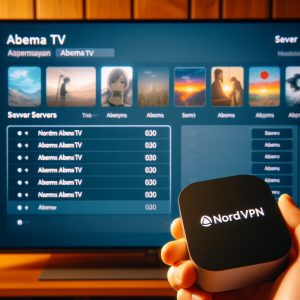
Does NordVPN Work with AbemaTV?
The ideal mix of strong encryption (AES-256-GCM) and a vast regional server network in Japan makes NordVPN highly capable of granting access to geo-restricted AbemaTV content abroad.
Testing has shown its reliability in successfully unblocking and smoothly streaming restricted shows on AbemaTV outside Japan without slow speeds or disconnections. Reasons it works so well:
Dedicated Japan Server Infrastructure – NordVPN operates hundreds of servers in Tokyo, Osaka and across Japan that provide the needed IP addresses helping overcome geo-restrictions.
Consistent High Speeds – 500 Mbps+ download speeds ensure zero lag when streaming HD shows. Fast server switching also aids in quickly troubleshooting any blocked connections.
Proven Ability to Bypass Geoblocks – Being location anonymity experts, NordVPN has demonstrated repeated success in unlocking regionally blocked streaming platforms like Netflix, Hulu, BBC iPlayer beyond just Japanese sites.
So NordVPN offers a tried and tested solution for expatriates in the US, UK or non-Japanese viewers worldwide to break through AbemaTV barriers enabling accessible anime and J-drama entertainment abroad.
Troubleshooting: AbemaTV Not Working with VPN
Using the optimal Japan server, AbemaTV access is usually smooth with NordVPN. However, in some cases connection issues may arise:
Server Busy/ Under Maintenance – If you get blocked, first try switching to another Japan server located in a different Japanese city to obtain a fresh IP address that may not be blocked.
Outdated VPN App – Ensure NordVPN app is updated to leverage the newest server network infrastructure and software updates needed to bypass advanced geo-restrictions.
Disable VPN Kill Switch – Temporarily turn off VPN kill switch under settings while testing connections. The safety feature may end up blocking all traffic including AbemaTV streams.
Checking these usual suspects helps mitigate common VPN connection issues accessing geo-fenced streaming content like AbemaTV from abroad. NordVPN’s responsive customer support can additionally troubleshoot specific problems accessing Japan streaming libraries.
Conclusion
AbemaTV has quickly become Japan’s top online TV platform for free streaming of anime, dramas and Japanese variety shows. However geo-blocking leaves international viewers frustrated without access abroad. This is where subscribing to NordVPN easily solves issues related to region restrictions.
Offering reliable connections via local Japan-based servers, NordVPN provides the ideal mix of speeds, security protections and toolsets needed to bypass blocks preventing access to AbemaTV outside Japan. Setup only takes a few minutes before enjoying J-culture entertainment to the fullest, overseas.
So if you are travelling or residing abroad long-term desiring your Abema fix, leverage NordVPN local servers to break through geo-barriers, securely stream the very latest episodes subbed or raw…and immerse yourself in Japan’s leading internet TV experience anywhere globally.
Introduction
A Virtual Private Network (VPN) has become an essential tool for protecting one’s privacy and security while using public internet connections. Among the various VPN protocols, Secure Socket Tunneling Protocol (SSTP) is steadily gaining popularity among Windows users for creating encrypted VPN connections.
SSTP is a proprietary VPN protocol introduced and trademarked by Microsoft. As the name suggests, it relies on the highly secure SSL/TLS protocol for establishing a secured VPN tunnel. Traffic passing through an SSTP tunnel benefits from encapsulation within HTTPS, providing effective defense against threats.
With native integration into Microsoft’s Windows OS and inbuilt encryption capabilities, SSTP offers Windows users a fast and convenient way for creating VPN links to access remote private networks or evade internet restrictions and blocking.

What is SSTP VPN?
Introduced in Windows Vista Service Pack 1, Secure Socket Tunneling Protocol or SSTP is a VPN protocol developed by Microsoft that uses the SSL (Secure Sockets Layer) or TLS (Transport Layer Security) protocol to provide a secured connection between a client and VPN server for Windows PCs.
It enables the encapsulation of Point to Point Protocol (PPP) traffic over SSL channels providing a mechanism to bypass internet censorship and geo-blocked access.
Development and Working
In 2005, Microsoft began work for a new VPN tunneling protocol after acknowledging vulnerabilities in commonly used protocols like PPTP. They conceptualized SSTP as a successor to Microsoft’s aging PPTP and the prevalent L2TP IPsec protocol.
The SSTP protocol was designed to offer the protection and authentication of L2TP/IPsec through the highly secure encryption channels offered by the SSL protocol over TCP port 443. This allowed easier traversal of NAT gateways and firewalls compared to L2TP/IPsec.
By encapsulating PPP traffic over SSL – protected channels, SSTP enables the secure transport of data across public internet infrastructure. Servers only require TCP port 443 enabled instead of multiple ports like other protocols.
Comparison with PPTP and L2TP
Unlike PPTP tunnels which have proven vulnerable to security threats, SSTP data channels rely on strong 256-bit SSL encryption between VPN peers. Authentication uses SSL certificates compared to the preshared key model of PPTP.
And while L2TP/IPsec may seem comparably secure on paper, SSTP enjoys wider accessibility through firewalls and offers better speeds over long distances. No additional client software installation is required beyond SSL libraries as SSTP uses native Windows PPP drivers.

Security of SSTP VPN
Microsoft’s SSTP protocol combines the security capabilities of L2TP IPsec VPNs with the intense encryption strengths of SSL VPNs. Some core security features include:
SSL Layer Security
SSTP rides its VPN connections over SSL 3.0 thereby gaining immediate access through common HTTPS ports. The TLS transport layer encrypts packets preventing deep packet analysis attacks.
Server Authentication
SSTP authenticates VPN servers using standard PKI SSL certificates. 2048-bit RSA certificates secure the handshake and key setup process between an SSTP client and server.
Data Authentication
Once security keys are exchanged, the SSL layer additionally protects encapsulated data from tampering by attackers using SHA-1 based hashes for traffic authentication and integrity checks.
Encryption
SSTP uses cipher suites like RC4-SHA and AES-256 to enable robust SSL encryption with up to 256-bit keys for PPP payload protection. MS-CHAPv2 and EAP ensure user data privacy.
This layered security model prevents SSTP tunnels being compromised through spoofing, tampering or sniffing attempts. Bypassing SSL protection is rendered nearly impossible if sufficiently long keys are used.
Advantages of SSTP VPN
- Seamlessly integrated into Microsoft Windows
- Supports SSL encryption up to 256-bit strength
- Uses single well-known HTTPS port for connections
- Compatible with firewalls and web proxies
- Provides data authentication checks
- Offers good speeds over high latency networks
- No additional client software installation needed
For Windows users, SSTP brings VPN capabilities built into the OS without resorting to third party tools. It avoids dependencies on IPsec associations or infrastructure not easily available on public internet. Reliance on widely used SSL libraries and certificates ensures broader interoperability.
Disadvantages of SSTP VPN
- Not open-source, fully controlled by Microsoft
- SSL overhead causes up to 10% performance hit
- Often blocked in countries upholding internet censorship
- Can only run on Vista SP1 onwards Windows versions
- SSL credentials may not validate on some projects
- Lacks perfect forward secrecy of protocols like OpenVPN
While perfectly fine for secure remote access, SSTP has limitations when used outside controlled environments. It works best alongside SSL inspection tools with access to certificate authorities and suffers issues in restricted regions. Non-Windows clients lack native support as well.
Applications of SSTP VPN
Microsoft promotes SSTP’s use for connecting enterprise or small business networks over public internet infrastructure avoiding the costs of dedicated leased lines.
Secure Remote Access
For organizations, SSTP offers an inexpensive way to enable remote employees to securely access internal corporate networks from external connections including homes, hotels and hotspots.
It requires only minor infrastructure adjustments compared to traditional IPSec setups. Especially suitable for virtualized environments, MS Azure VPN gateways primarily use SSTP for such access.
Smart Grid Networks
In energy delivery systems like smart grids, SSTP provides robust site-to-site connectivity of advanced metering infrastructure over large areas utilizing existing internet networks instead of private links. Data analytics, distribution management and load balancing applications utilize SSTP VPN connectivity.

How to Setup SSTP VPN
Here is a step-by-step guide to setting up SSTP VPN manually on supported Windows and Linux distributions:
On Windows OS
- Enable Routing and Remote Access from Control Panel > Programs > Turn Windows features on or off
- Open Routing and Remote Access console, right click VPN server and choose Configure and Enable.
- Add user accounts and groups that require remote VPN access under Dial-in tab and access permission rights. Click Ok.
- Right click Network Interfaces > New Demand Dial Interface > Select VPN connection.
- Set IP address pool for VPN clients. Confirm configurations.
- Click Apply to create an SSTP VPN connection which now shows under VPN Connections list.
On Linux
- Install Microsoft’s sstp-client package on kernel 3.6+ Linux distribution using terminal:
sudo apt install sstp-client
- Create a new configuration file:
nano /etc/sstpc/yourconfigname.conf
- Set sstp server address, authentication details
server {SSTP server IP};
username {username};
password {password};
- Apply the config and start the connection:
sudo sstpc --log /var/log/sstpc.log --config /etc/sstpc/yourconfigname.conf
This creates an active SSTP VPN tunnel rerouting traffic over the SSL link.
For improved security however, SSTP is best used on Windows platforms offering native integration with certificate authorities ensuring reliable server authentication and network endpoint identification.
Conclusion
Microsoft’s proprietary SSTP brings effective VPN capabilities to Windows networks through widespread SSL libraries and native OS support. TLS-based encryption, server authentication using PKI certificates and integrated PPP handling give SSTP VPN definite advantages over legacy PPTP.
It avoids complex IPsec infrastructure and provides better Nat/firewall traversal than L2TP. 2048-bit RSA keys secure traffic integrity checks between endpoints. For Windows environments, SSTP is easier to setup than OpenVPN.
However for open-source Linux networks, SoftEther VPN with SSL-VPN capabilities offers a full-featured cross-platform SSTP alternative. As Microsoft limits SSTP for Windows and Azure users only, better future exists for emerging VPN protocols building in SSL and Elliptic curve cryptography support.
SSTP fills an important niche securing remote access and distributed network links across enterprises. It promises better speeds than OpenVPN but lacks advanced configurations beyond Microsoft’s proprietary solution. For privacy-centric users, OpenVPN still ranks higher while SSTP best serves Windows server links.
Introduction
Public Wi-Fi networks are convenient for accessing the internet on the go, but also pose significant security and privacy risks. When you connect to a public Wi-Fi network in places like cafes, airports, hotels, etc., your data becomes vulnerable to intruders unless appropriate safety measures are taken. Using a Virtual Private Network (VPN) is an effective way to secure your devices, online activity, and personal information when using a public Wi-Fi connection.
A VPN establishes an encrypted tunnel between your device and a remote server operated by a VPN service. All data traffic originating from your device is routed through this tunnel, hiding your online activity from eavesdroppers and hackers on the public Wi-Fi network. A reliable VPN prevents unauthorized access to sensitive information transmitted over public hotspots, secures online transactions, and protects your identity from cyber threats. This article will discuss what a VPN is, the risks of using public Wi-Fi without a VPN, the importance of VPNs for Wi-Fi security, step-by-step setup guides for VPNs on various devices, popular VPN services for Wi-Fi users, and recommendations for choosing a suitable VPN solution based on individual needs.

What is a VPN?
A Virtual Private Network, commonly known as a VPN, is an encrypted connection over the internet that provides a secure tunnel for data transmission between a user’s local network and the public internet. It connects your device—a phone, tablet, laptop, or desktop—to a remote VPN server operated by a VPN service provider. All incoming and outgoing network traffic is then securely routed through this VPN server using a process called tunneling.
The encrypted VPN tunnel protects your data from being snooped on or modified over the public Wi-Fi network as it travels to its destination. This allows users to securely access local network resources, connect to the internet, share data, or stream content—all while safely hiding real IP addresses and bypassing geographical restrictions. In short, a VPN gives you online privacy, anonymity and data security when on the go.
Some key benefits offered by using a reliable VPN service for public Wi-Fi connections include:
- Securely accessing sensitive information or online accounts
- Keeping browsing activity, data transmissions private
- Accessing geo-restricted content
- Torrenting securely and anonymously
- Circumventing internet censorship
- Enhanced protection on multiple devices
- Avoiding targeted ads, malware and phishing
Without the encryption and IP masking provided by a VPN, public hotspots can pose the risk of:
- Data theft or leakage
- Identity and privacy compromise
- Cyber attacks that exploit hotspot vulnerabilities
- Tracking of browsing habits for targeted advertising
Risks of Using Public Wi-Fi
Public Wi-Fi networks have little to no encryption implemented. While they offer the convenience of internet access for workers, travellers and mobile users, this connectivity comes at the cost of cyber security. Snooping on unprotected public Wi-Fi networks is relatively easy for experienced hackers. So how exactly does using a public hotspot put your privacy and data at risk?
Easy Data Interception
The biggest risk is that of data interception through techniques like packet sniffing. When connected to an open Wi-Fi network, all the data you send and receive—from login credentials, emails, messages to credit card details—can be easily intercepted using sniffing tools. With access to the same network, sniffers can extract this data flowing in the open. Unencrypted internet connections offer no protection against such attacks.
Accessing Devices & Network Resources
An even more dangerous risk is that intruders can gain access to your device and connected networks resources when you connect to a hotspot by exploiting vulnerabilities and misconfigurations. Once hackers gain access, they can steal sensitive files, install malware, access internal organization networks and resources in the case of corporate devices, resulting in data theft and security disasters.
Session Hijacking
A common technique used in public hotspots involves the hijacking of sessions after the user authentication process is complete. The hacker takes over the wireless session forcing the user to disconnect while they access protected resources using the victim’s session ID. Personal information submitted during this hijacked session then comes under the attacker’s control.
Phishing and Spreading Infections
Furthermore, connecting multiple devices to a public Wi-Fi network also increases their exposure to phishing attacks, viruses, worms, botnets that can spread quickly from one unprotected device to another. Downloads and internet activity on such hotspots is particularly vulnerable to malware infections.
Tracking User Activity
Public Wi-Fi owners and hotspot operators have the ability to intercept wireless traffic, analyze the data for usage patterns and monitor user activity by collecting personal details, web usage and location data. Such user behavior can then potentially be sold to third parties for targeted advertising without consent.
So while free public networks provide easy access to internet services, allowing hotspot owners to openly view your information, they severely compromise user privacy through various data interception techniques. All online activity and transactions over such unsecured connections put your sensitive information at risk if no VPN protection is used.

Importance of VPN for Wi-Fi Security
A Virtual Private Network (VPN) is designed to establish secure remote access connections and tunnel traffic via encrypted channels over public networks. VPN services offer a simple and effective solution to mitigate the inherent risks in using free public Wi-Fi by:
Encrypting Data
Using advanced encryption protocols like AES 256-bit, OpenVPN and IKEv2, a VPN service secures all data travelling between your device and the VPN server in an encrypted tunnel. This encoded data tunnel cannot be penetrated by prying eyes or sniffing attacks on insecure public networks.
Anonymizing Connections
By masking your IP address, a reliable VPN prevents hotspot owners, cyber criminals and internet providers from tracking your actual location, monitoring browsing activity or identifying your devices through the IP assigned on public networks. This ensures you remain 100% anonymous over Wi-Fi.
Securing Sensitive Transactions
VPNs come with essential data leak protection tools like Internet kill switches, DNS leak protection, IPv6 leak protection to prevent the exposure of identifying metadata when using a hotspot. Financial transactions, online shopping payment info and account access credentials remain secured.
Bypassing Geographical Restrictions
Connecting via a VPN server lets you bypass location-based access restrictions when travelling abroad. Content and streaming services blocked in certain regions can be accessed over Wi-Fi by masking your location via VPN IP addresses from other countries and regions.
Preventing Activity Tracking
With a VPN, all website requests look like they are coming from the VPN IP rather than your personal IP address. This prevents the external tracking of browsing patterns, analyzer tools and targeted advertising which violate user privacy. Hotspot owners cannot monitor your usage.
Securing Multiple Devices
Unlike proxies, reliable VPN services can simultaneously secure all Wi-Fi connected devices – laptops, phones, tablets or gaming consoles through one VPN account. This ensures reliable protection across all your gadgets when connecting from different public hotspots.
So using a VPN is no longer an option but an absolute necessity to ensure privacy protections, secure online activity, and anonymity over any public Wi-Fi network. VPN services provide a vital layer of data security that combats external cyber threats, intercepting sniffers and prying hackers exploiting hotspot vulnerabilities.
How to Set Up a VPN for Wi-Fi
Setting up and connecting to a VPN service is a quick and simple process across devices and operating systems. Here is a step-by-step guide for configuring a VPN on Windows PCs, Mac computers, iOS and Android smartphones:
On Windows
- Select a suitable paid VPN subscription plan from a provider like NordVPN, ExpressVPN, CyberGhost etc. based on reliability, connection speeds and security features.
- Download and install the VPN app for Windows desktop from the provider’s website or the Microsoft Store.
- Launch the app once installed. Enter the activation code or login credentials to set up your account.
- Select a server location from countries like US, UK, Canada, Australia based on required location access or legal restrictions.
- Connect via a protocol – OpenVPN, L2TP being the most secure. Use IKEv2 for faster connectivity.
- The VPN will now encrypt your internet traffic, mask your IP and secure your Wi-Fi connections across browsers and apps.
On Mac OS
- Purchase a VPN plan and download the Mac app from their site, be it NordVPN, Surfshark or other reputable providers.
- Install the Mac VPN app on devices running macOS, OS X or an older Mac OS version that’s compatible.
- Open the app and add your VPN credentials or import your activation code to log in.
- Browse and select a VPN server location to channel traffic through that country or city.
- Enable encryption using OpenVPN UDP or TCP and connect to secure your Wi-Fi. Tunnel all traffic including Safari, media apps and torrent clients.
On iPhone & iPad
- Install a VPN iOS app from the App Store. Top brands offer dedicated iOS VPN apps.
- Tap the app to open it and sign in using your VPN subscription details.
- Tap locations and select an available VPN server. Supplementary tools like an internet kill switch are also available.
- Slide the Connect button. VPN will then encrypt Safari, messages, media and all iOS traffic over Wi-Fi.
On Android
- Download a VPN app for Android from reliable brands through the Google Play app store.
- Open the Android VPN app post-installation and enter your account login email ID and password.
- Tap the server location of your choice to funnel traffic through that country or city’s IP.
- Slide or enable the Connect button to secure Wi-Fi connections on your Android device and tunnel all mobile traffic.
VPNs only take a few quick minutes to setup across platforms. Connecting it before using public Wi-Fi adds a strong layer of protection allowing you to browse securely and maintain your right to internet privacy across hotspots.

Popular VPN Services for Wi-Fi
When choosing a suitable VPN service for securing your Wi-Fi connections, the following features and capabilities are key factors to consider:
Reliable Security Protocols
Look for support modern protocols like OpenVPN, IKEv2, WireGuard that offer strongest 256-bit AES encryption for data security. Tools like an internet kill switch, IPv6 and DNS leak protection are also vital.
Speed Performance
Faster connection speeds offered by network servers provide low latency and no buffering issues when streaming or surfing over Wi-Fi. Multi-gigabit bandwidth capabilities ensure smoother performance.
Multiple Device Protection
Simultaneous protection across platforms – Windows, macOS, Android, iOS and Linux OS through one account offers more comprehensive Wi-Fi security for all your gadgets.
Global Server Network
An expansive network of regional VPN servers helps bypass geoblocks, enhances performance uptime, offers more IP choices to mask your identity and location.
Some top-rated VPN services ticking all boxes for public Wi-Fi users:
1. NordVPN
The Panama-based provider has over 5400 servers across 60 countries running on fast 10-Gbit networks. Highest-grade AES-256-CBC encryption, advanced security protocols, dedicated apps across devices and reliable customer service make NordVPN the best VPN brand for Wi-Fi security seekers.
2. ExpressVPN
ExpressVPN consistently ranks among the fastest VPN providers with its huge spread of 3000+ global VPN servers, watertight AES-256 encryption and unlimited bandwidth capabilities. Media streaming buffer-free and lag-free connections make it ideal for Wi-Fi usage.
3. Surfshark
This secure VPN service is gaining popularity with its budget-friendly pricing, AES-256 encryption, multihop connections and over 3200 servers in 100+ countries. With capable speeds and unlimited device support, it’s a worthy VPN for securing all Wi-Fi network access.
4. CyberGhost
Romania-based CyberGhost is known for its user-friendly apps, 7000+ fast servers providing top streaming speeds and torrenting support. Stringent no-logging policies, AES-256 & IKEv2 encryption, ad blocker and strict browser privacy controls make CyberGhost a top VPN pick for Wi-Fi connections.
Based on individual preferences for pricing, encryption standards, logging policies, server locations and supported platforms – NordVPN, ExpressVPN, Surfshark and CyberGhost have proven their reliability in securing public Wi-Fi usage for internet users.
Conclusion
Public Wi-Fi undoubtedly makes accessing the web incredibly convenient for travellers and mobile workers. But joining any open network also makes devices and sensitive user information prime targets for data theft and privacy invasions by hackers lurking around unsecured hotspots.
A VPN is essential when using any public Wi-Fi connection as it enables users to securely browse the internet, access media content, share data and conduct online transactions without compromising privacy protections. VPNs offer a vital encrypted tunnel mitigating the various vulnerabilities of open hotspot that leave internet traffic and user data exposed.
Easy-to-setup, fast VPN apps providing robust encryption protocols across devices ensure everyday browsing security for accessing the internet via free public networks. Whether at airports, cafes or hotels, connecting to Wi-Fi through a reliable VPN service before surfing or streaming over public networks should now be standard secure access protocol for all users and organizations. Adopting this simple security measure goes a long way to prevent identity theft, financial fraud, location tracking and other cybercrimes targeted at public Wi-Fi users.
I. Introduction
A virtual private network (VPN) is an essential online privacy and security tool that encrypts internet traffic and masks your IP address and online identity. PayPal is a popular online payment processor used by millions worldwide.
Many VPN services accept payment through traditional credit cards and PayPal for subscription plans. However, using PayPal does introduce a conflict with the VPN goal of preserving complete anonymity. This guide will explore methods for keeping your financial identity secure when paying for VPN service using PayPal or alternative anonymous crypto payment options.

II. Creating a Stealth PayPal Account
The first step towards privacy when purchasing a VPN plan through PayPal is creating a “burner” stealth account not tied to your real identity:
- Use a new email address from a secure provider like ProtonMail or Tutanota rather than Gmail. Ideally create one while connected to a trusted VPN for additional anonymity.
- When creating your stealth PayPal account, avoid inputting any personal details like real name, address or date of birth during sign up.
- For added security, you can further anonymize connections to PayPal by signing up and accessing the burner account exclusively through a trust VPN or Tor browser to mask your IP.
By logging into this stealth PayPal account from random public Wi-Fi networks, even PayPal itself cannot easily trace back to your true identity. Now you have an anonymous payment method to safely fund VPN services without revealing financial and purchase history.
III. Your Own Outline VPN Server
Rather than exposing payment details to a third party VPN provider, another option is creating your own private VPN server for secure traffic tunneling. This offers unmatched privacy since you control the hosting infrastructure:
Benefits:
- No usage or financial data handed to external services
- Scale server resources matching personal connection needs
- Choose from thousands of global IP endpoints to reveal location
- Invite only access guarantees capacity for your devices
Sounds great, but is running your own VPN server realistic for average consumers? In short – yes! Services like Outline and Streisand make easy self-hosting home VPN access cheaper than ever:
Outline Manager Created by Jigsaw – Alphabet’s technology incubator – Outline provides open source tools for rapidly deploying personal VPN infrastructure. Requirements:
- Cloud server account like DigitalOcean ($5/mo basic VPS)
- Domain name for custom URL and SSL encryption
- Outline Manager software installed on your device
That handles the heavy lifting configuring secure Shadowsocks connections, custom plugins and domain/SSL features you manage through simple Outline apps linking Windows, Mac, iOS or Android. Cost equals any economic VPS provider plus $10-15 annually averaging most domains.
With server and client software handling encryption automatically, you get convenience of typical VPN provider but with the personalized password and DNS controlled advantages.
Advanced technical skills are not a barrier either following detailed Outline deployment guides. For less than $100 yearly you can route internet activity across a private, uncapped server without relying any VPN middlemen.

IV. Paying for VPN Anonymously
If opting for a commercial VPN provider rather than self-hosted, certain precautions are necessary keeping payment details private:
Methods:
- Buy VPN gift cards from Amazon, BestBuy using cash. Redeem card codes to pay anonymously.
- Rotating virtual debit cards like Privacy.com to fund accounts avoids real bank info.
But exercise caution – many VPN provider terms of service strictly forbid using gift cards or virtual credit cards. Subscriptions may be cancelled if alternate funding detected. So first read service policies before pursuing grey area payment tactics some classify as fraud.
Better yet embrace legit direct anonymous options next.
Is PayPal Safe for VPN?
PayPal is not ideal but unavoidably necessary for many VPN subscribers. All reputable services like ExpressVPN and NordVPN accept PayPal alongside traditional payment processors like Visa and MasterCard.
While not fully anonymous, well rated VPNs gaining mainstream traction do take steps protecting user data like:
- No activity/usage logs detailing sites visited
- No IP address leakages
- No session timestamps tracked
So beyond financial history, PayPal VPN payments reveal limited identifying information thanks to no monitoring usage or traffic. For maximum privacy however, the crypto method below is recommended.
V. Paying for VPN with Cryptocurrency
VPN veterans acknowledge cryptocurrency as the truly anonymous VPN payment method offering full confidentiality:
- Major coins like Bitcoin, Ethereum or Monero transfers reveal no personal financial data
- Crypto purchases available from leading VPNs like CyberGhost, Surfshark
- Some niche VPNs dealing crypto exclusively like BlufVPN
Transaction flows for funding a VPN subscription by crypto:
- Acquire cryptocurrency from exchange like Coinbase
- Send coins to VPN provider issued wallet address
- VPN account reflects paid status allowing secure connections
Each month additional coins sent extend subscription without relying banks or middlemen processors tracking activities. Just be cautious holding large crypto balances as exchange hack history confirms.
Instead only keeping minimal coins in hot wallets needed for planned monthly VPN payments makes the safer bet. And investigate VPN refund policies before purchasing multi-year deals upfront in cryptocurrency.
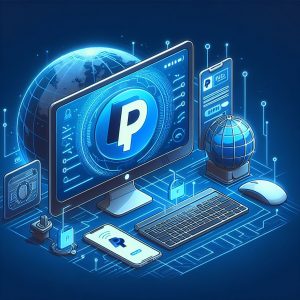
VI. Conclusion
I hope this piece covered all considerations around incorporating VPN usage with PayPal accounts plus alternate solutions maximizing privacy. While PayPal itself certainly works paying for top VPN services, take a few easy precautions like setup burner accounts for true anonymity.
Or for the ultimate confidentiality, deploy your own VPN server through simplified tools like Outline putting you fully control. And leveraging the blockchain power behind cryptocurrencies enables a VPN funding avenue no company or government can block – ideal for getting around restricted environments.
Whichever method you pursue ensuring secure VPN access, take the initiative learning self-hosting principles or how emerging crypto technologies interface with encrypted tunnels. This puts power back in your hands rather relying oversight by corporate VPN entities or payment processors holding data.
Take the first step towards a more private internet experience on your own terms. Reach out with any questions arising implementing recommended steps outlined above!
Introduction
An obfuscated VPN is a type of virtual private network connection that uses special protocols to disguise VPN traffic as regular HTTPS internet browsing data. This prevents outsiders such as internet service providers (ISPs), government agencies, or streaming platforms from recognizing and blocking VPN connections.
VPNs are often used to bypass geo-restrictions, access censored content, securely connect to public WiFis, and keep browsing activities private. However, many organizations actively try stopping VPN connections which they see as threatening infrastructure or violating terms of service.
Obfuscation solutions hide the fact a VPN tunnel exists altogether. Instead of easily identifiable protocols like OpenVPN or IKEv2 that mark VPN traffic through telltale fingerprints in data packets, obfuscated alternatives appear indistinguishable from any other HTTPS web browsing session.
Let’s explore what specific obfuscation technologies are available, why obfuscation matters for preserving digital privacy, and steps for configuring a VPN connection with obfuscation enabled for max censorship circumvention capability.

Obfuscation Methods
There are a few common methods virtual private network providers use to disguise VPN traffic, each having their own pros and cons:
- Shadowsocks Shadowsocks operates at OSI level 3 (net layer) to encrypt traffic payload, obfuscating contents in a non-descriptive way unidentifiable through superficial packet inspection. However encryption headers may still reveal VPN usage unless additional obfsproxy plugins activated. Open source codebase allows customization.
- Obfsproxy Obfsproxy works in conjunction with more commonly used VPN software suites as a plugin layer to further anonymize network data and defeat common VPN blocking techniques:
- Traffic Flow Obfuscation – Modifies size/timing of packets to avoid set VPN flow patterns
- Cert Fingerprint Obfuscation – Spoofs fake certificate credentials appearing as normal web traffic
- Protocol Obfuscation – Morphs VPN connections to mimic other protocols like HTTP to bypass firewall rules
Obfsproxy proven effective getting past deep packet inspection thanks to these adaptive “traffic shaping” mechanisms. As standalone solution lacks encryption so requires pairing with OpenVPN or other VPN tunnel.
- Stunnel Stunnel encrypts datasessions at the transport layer then uses industry standard Secure Sockets Layer/Transport Layer Security (SSL/TLS) protocols for routing packets. This allows tunneling VPN connections inside an encrypted channel appearing identical to any remote device accessing a SSL protected website. In this sense Stunnel is “piggybacking” VPN on the back of legitimate HTTPS traffic.
- OpenConnect Originally developed by Cisco, OpenConnect defines connections for its own AnyConnect SSL VPN client using standard HTTPS ports and TLS protocols. Thus OpenConnect VPN traffic remains indistinguishable from any benign HTTPS web browsing data.
Open source forks like ocserv now available allowing setup of customize OpenConnect VPNs without Cisco products. However less configurability and features compared to OpenVPN.
As shown above, obfuscated VPN solutions use varied technical approaches. But each abides by the same principles – anonymize data at a packet level while encapsulating transmissions in legitimate seeming protocols like HTTPS. This makes VPN traffic metadata blend into the vast internet noise.
Use Cases
Now that you understand how obfuscated VPN protocols function at a technical level, what are some real-world examples where obfuscation circumvents blocks to access internet content?
Here are the most common use cases:
Bypassing National Firewalls and ISP Throttling
Many authoritarian countries like China, Iran and Russia operate nationwide firewall systems that explicitly block VPN traffic through deep packet inspection. So obfuscation techniques are mandatory for locals needing VPN tunnels providing uncensored internet access.
Obfsproxy setup with the popular OpenVPN protocol succeeds bypassing firewall DPI more readily than using OpenVPN alone which has very distinguishable traffic patterns. Popular VPN provider NordVPN launched obfuscated servers called NordLynx last year using WireGuard and custom masking techniques allowing several thousand users in restrictive countries regain VPN access that had been lost.
Similarly on a smaller scale, some US internet providers throttle detected P2P transfers and video streaming traffic on home networks. Adding an obfsproxy plugin layer tricks ISP throttling by causing VPN connections to bypass traffic detection systems.
Circumventing Streaming Geo-blocks
Streaming platforms vigilant against VPN connections geo-spoofing location to access blacked out content in unauthorized regions frequently block detected VPN traffic. For example Netflix prominently blocks IPs belonging to thousands of static VPN servers.
Obfuscation helps avoid IP ranges known by streaming sites to belong to VPN services. By hiding VPN traffic signature, obfuscated data streams avoid geo-location checks granting much greater success accessing region-exclusive film and tv libraries abroad just like a local viewer located internally. SSH tunneling or OpenVPN over SSL works to unblock Netflix, Hulu, Sky Go and similar video sites with increasing reliability compared to standard VPN approach alone.
Protecting Traffic from Public WiFi Snooping
On unsecured public WiFi networks, user internet traffic faces serious sniffing threats from bad actors who can steal passwords, banking details and other unencrypted data from shared traffic streams.
Accessing any private data over HTTPS websites already provides a baseline level of encryption safe from prying eyes. Adding an extra obfuscated VPN tunnel on top hides the fact VPN encryption is even taking place. This provides an untraceable cloaking mechanism ideal for guarding sensitive mobile traffic and anonymous tracked browsing activity in public places.

Implementation
Now we will outline how to actually setup an obfuscated VPN configuration protecting your internet traffic across devices:
Desktop OS Install
- Establish your base VPN connection using preferred provider software first without obfuscation enabled. Confirm basic feature functionality.
- Install additional plugins like Obfsproxy adding the obfuscation layer integrated natively into your existing VPN client software suite:
Windows – Download and install the Obfsproxy executable then direct OpenVPN client instance to leverage service similar to a proxy obedience setting. Configure cipher mode.
MacOS – Tunnelblick VPN software for OS X has built-in support enabling Obfsproxy support which becomes active when specified server offering obfuscation connected.
Linux – Most distributions include open source Obfsproxy in software repositories or bundled within security focused distros like Tails allowing enabling obfuscated connections in OpenVPN profiles.
- Connect VPN app to obfuscated-enabled server and check for DNS/IP leaks to confirm obfuscation operative without traffic escaping box tunnel to reveal true user identity behind the VPN curtain.
Router-based Configuration
Third party open source router firmware enables configuring an obfuscated VPN tunnel at the device level funnelling all wireless network traffic from connected laptops, phones and smart home equipment through the encrypted exit node:
- Install DDWRT or OpenWRT open source firmware on compatible router replacing stock OS; unlocking more VPN features.
Reset device and access admin panel.
- Navigate VPN menu and input necessary credentials + remote server settings provided by commercial VPN provider with obfuscation capacity such as NordVPN or ExpressVPN. Select protocol supporting obfuscation extensions like OpenVPN. Enable add-ons such as Scramblesuit plugin.
- Save changes and connect router to obfuscated VPN remote server through new VPN interface. Confirm connection successful and all home devices now have internet traffic passing only through active obfuscated tunnel.
Using reputable VPN provider infrastructure and the steps above correctly integrate OpenVPN obfuscation plugins fortifies VPN protection from common blocking and throttling measures. However no method promises guaranteed, perpetual access. Ongoing upkeep is required as access restrictions and counter technologies evolve on all sides.
Challenges and Solutions
While obfuscated VPN protocols foil many basic network filtering techniques, increasingly sophisticated AI-supported mechanisms deployed by streaming giants and iron-fisted regimes continually threaten to undermine VPN traffic slipping past gates.
Let’s examine some real world examples of obfuscated VPN blocking scenarios and ways administrators work rapidly to Nullify restrictions while users take proactive measures preserving their digital liberties.
Russia Blacklists “Anonymous” Traffic Including VPNs
In 2021 Russian internet regulations mandated that all internet traffic flow through government-controlled routing gateways enabling analysis and filtering protocols deemed dangers to state security – namely obfuscated VPN connections granting uncensored web access. Deep packet inspection specifically keyed into data flows attempting obfuscation at the transport layer like OpenVPN over SSL/TLS.
While traditional VPN connections found almost all IP addresses blocked entirely, providers quickly shifted affected Russian customers to alternative obfuscated protocols called VLESS that further anonymized data and bypassed fresh DPI countermeasures for months subsequent until VLESS IPs ultimately landed on Russia’s expanding blacklist in late 2022.
This ongoing “cat and mouse” game shows the indispensability of VPN obfuscationcapabilities giving anti-censorship developers precious extra response time devising updated tunneling techniques that preserve open information access within oppressive regime strongholds. Having easily disabled obfuscation layers baked into VPN apps also allows nimble server-side upgrades keeping countries ounces ahead of pursuing technological suppression.
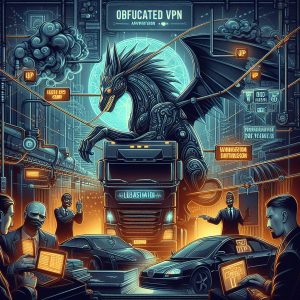
Conclusion
This guide covered the critical role obfuscated VPN connections fill reaching internet destinations made unreachable through mainstream VPN protocols alone when faced with advanced firewall AI actively working to sever access.
We decrypted how running VPN traffic through additional obfuscation transports like Shadowsocks, obfsproxy plugins, or common remote access protocols disguise data signatures. This in turn allows VPN packets slip past strict censorship technology undetected at growing rates to bypass geo-restrictions stopping locked streaming content plus provide citizens under authoritarian domes lifeline contact with outside world.
As national firewalls and ISP throttling technologies progress, the need for optimizing VPN resilience through multilayered obfuscation techniques intensifies. Supporting providers advancing stealth innovation helps ensure the VPN community and user rights advocates maintain the upper hand securing digital liberties for all still under threat from institutional suppression worldwide.
Though vpn-blocking restrictions will certainly continue evolving, dedication from VPN services making privacy protection and obfuscation central to their infrastructure design philosophy will provide the tools enabling more users tap liberty beyond borders.



























